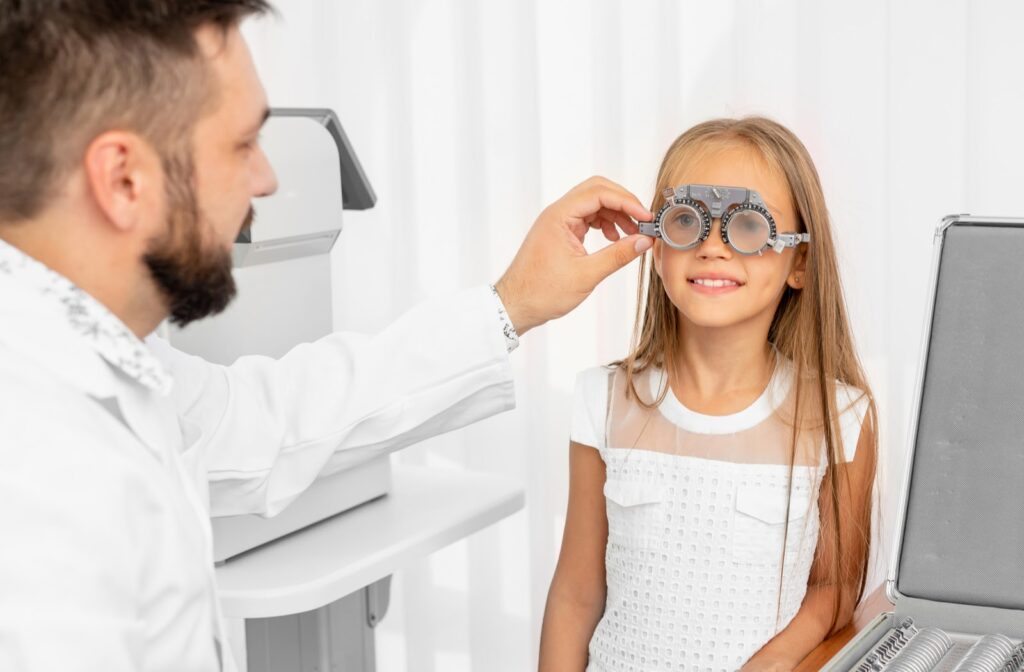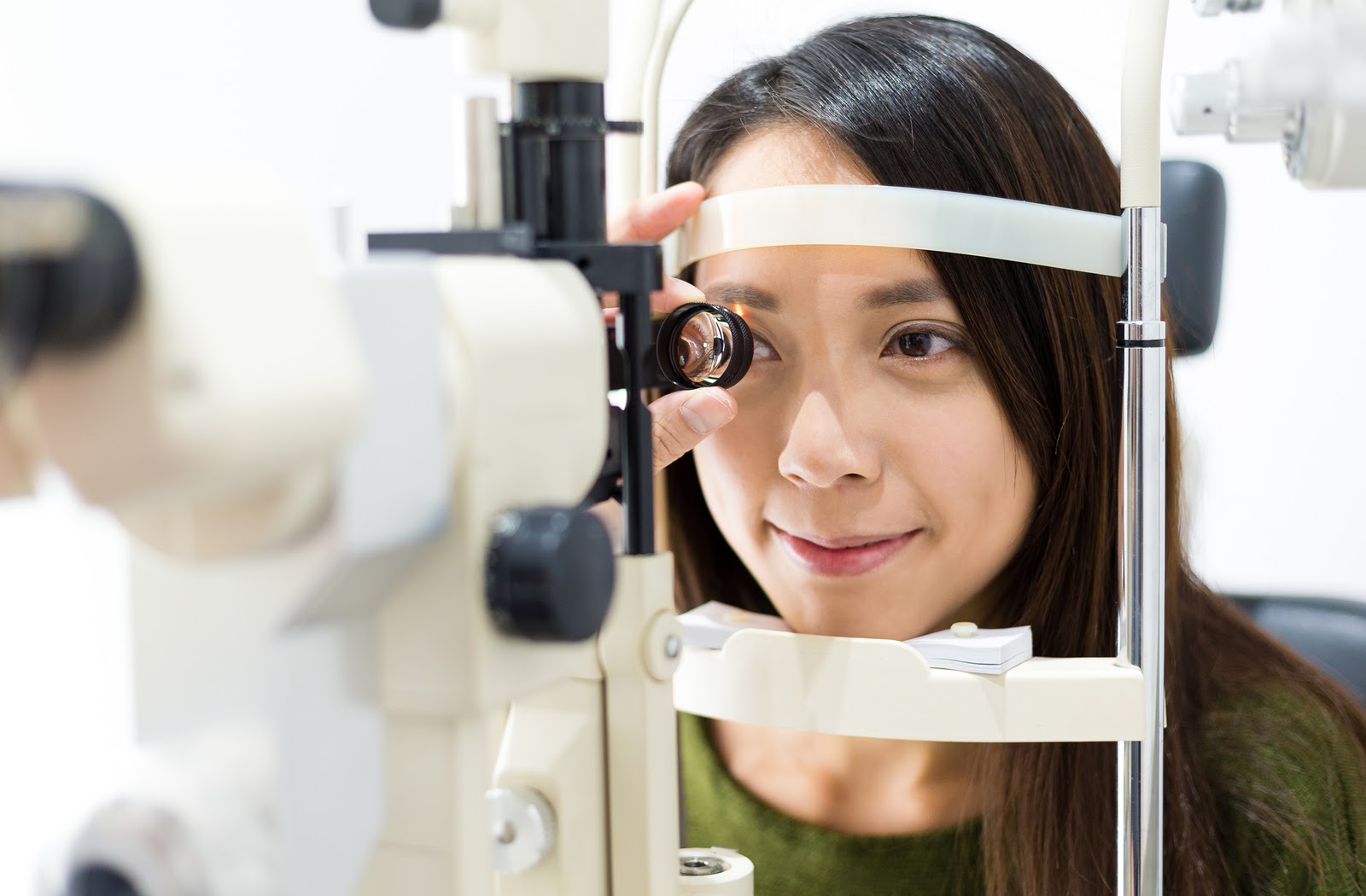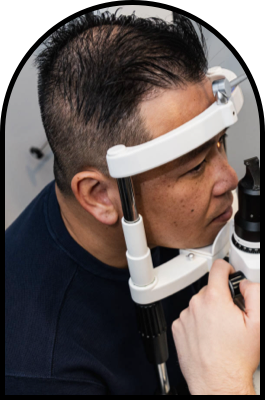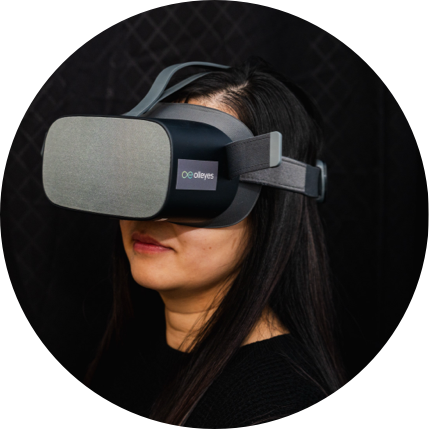Eye exams should be seen as essential, not optional.
The health of your eyes offers more than just the ability to see clearly. An in-depth eye exam for both children and adults alike can monitor potential eye diseases and health conditions that may go unnoticed otherwise. Regular eye exams can detect and treat issues early to avoid progression or serious damage to your vision.
Discover if it’s time to book your next appointment.
The Importance of Eye Exams
Eye exams are more than just determining if you need glasses or not, though it’s an important component. Your eyes are a window into your overall health. During an assessment, your trusted optometrist can detect eye disease, other health conditions, and monitor any changes to the eyes.
Detecting Eye Disease
Even if you have clear vision, it’s essential to schedule a comprehensive eye assessment regularly. Many serious eye diseases don’t present obvious signs and symptoms until the condition has progressed. Early detection and treatment will set you up for long-term visual success.
Common eye conditions that can be detected during an eye exam include:
- Age-Related Macular Degeneration
- Amblyopia (Lazy Eye)
- Cataracts
- Diabetic Retinopathy
- Glaucoma
- Refractive Errors
- Strabismus (Crossed Eyes)
Detecting Other Health Conditions
During a routine eye exam, warning signs for serious health conditions such as high blood pressure, high cholesterol, diabetes, and cancer can present themselves. In fact, over 270 health conditions can be detected.
The blood vessels in your retina are a good indicator of how healthy the blood vessels are in the rest of your body. Also, changes to the eye often precede or coincide with other systemic health conditions.
Up-to-Date Prescription
Your optometrist will monitor any changes to the eye and update your prescription. Maintaining the proper prescription will help you see clearly and put less strain on your eyes. With the appropriate glasses or contact lenses, your eyes won’t need to work overtime to focus on an image, avoiding the uncomfortable symptoms of eyestrain.
When Should You Schedule an Eye Exam?
Your eye health is a crucial component of everyday living. Don’t wait until you begin experiencing uncomfortable symptoms to book your next appointment. A regular eye exam will ensure you receive the proper care and treatment when needed to avoid irreversible damage to your sight.
A good schedule to follow, as advised by the Alberta Association of Optometrists, includes:
- Adults 20–64 should schedule an appointment every 1–2 years
- Adults 65+ should schedule an appointment annually
The recommended frequency of eye exams may change if your optometrist determines you’re at a higher risk of developing an eye disease or other complications. Factors that can put you at a higher risk include diabetes, hypertension, or family history.
How Often Should Your Child Have an Eye Exam?
Our eyes grow and develop throughout childhood. A comprehensive assessment can ensure your child is reaching important visual milestones and their eyes are healthy. Healthy eyes set your child up for success in and outside the classroom.
Detailed eye exams can detect any eye conditions that your child may not be able to vocalize themselves without a frame of reference for what normal vision looks and feels like. For frequency of eye exams, the Alberta Association of Optometrists recommends:
- Infants & Toddlers: your child should have their first eye exam between 6–9 months.
- Preschool Age Children: between 2–5, your child should undergo at least one comprehensive eye exam.
- School-Age Children: between 6–19, your child should visit their eye doctor annually.
Your optometrist may recommend more frequent eye exams, depending on the health of your little one’s eyes and if any eye conditions are present that need to be monitored.
What to Expect During a Comprehensive Eye Exam
When you visit your eye doctor for a comprehensive eye exam, you can expect to be greeted by friendly front desk team members who will ensure your information on file is up-to-date.
You will then be guided to the pre-testing area, where an optometric assistant will perform a series of preliminary tests. Each test is quick and non-invasive.
After the preliminary tests, your pre-tester will show you to the exam room. Your optometrist will greet you to go over your health history, answer any questions, and perform a series of comprehensive tests with the latest technology and techniques. After accurately assessing your eyes, your eye doctor will discuss any findings.
If it’s determined you have a refractive error that needs to be corrected, you’ll be provided with your prescription and led to view the frame and lens options available.

A Life With Clear Vision
Allow yourself peace of mind from potential sight-threatening conditions by scheduling regular eye exams, even if you believe your eyes are in top shape.
The team at Chestermere Optometry is passionate about providing quality eye care for the whole family to equip you with your best vision yet. Visit us for a detailed and personalized comprehensive eye exam.
Prioritize your eye health today!



























